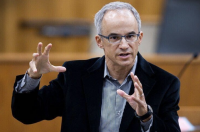
ENCORE: Interview: Ian Haney Lopez Talks Racism And Politics
The 21st sppke with constitutional lawyer, race and class scholar, and author Ian Haney Lopez about dog-whistle politics, and the role that race and class plays in electoral politics.
In-depth reporting from WILL, NPR, the Associated Press, and other sources
Contact WILL News at willnewsroom@illinois.edu

The 21st sppke with constitutional lawyer, race and class scholar, and author Ian Haney Lopez about dog-whistle politics, and the role that race and class plays in electoral politics.

A food and dining reporter at the Chicago Tribune who has years of experience making smaller Thanksgiving dinners on a single sheet pan, joined us to talk about how to prepare a Thanksgiving meal for one or a few.

Holidays can be a stressful time for many reasons. This year though, a lot of those typical stressors have been replaced with other concerns because of the pandemic. The 21st was joined by a clinical psychologist and a psychiatrist to help us navigate that stress and those difficult conversations with family.

Bernard Schoenburg and Doug Finke have been covering state government for Springfield’s State Journal-Register newspaper for decades. The two talked about retiring at the end of November 2020 and how covering the statehouse has changed over the years.

Author Henry James Garrett says we need more kindness in our lives — and not just little acts of kindness, but a deeper, moral kindness, rooted in empathy. He talks about his book, This Book Will Make You Kinder.
Campbell Hall
300 N. Goodwin
Urbana, IL 61801
217-333-7300